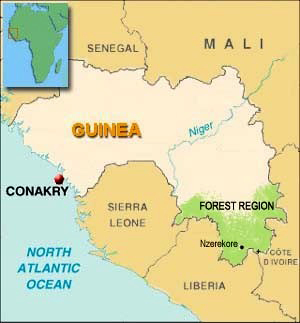CONAKRY
Despite serious reservations, Guinea's main opposition coalition has said it will take part in December's municipal elections which are widely seen as a test of the country's democratic reform process.
"The (coalition) will participate in these elections while remaining convinced that there are no guarantees of fair play," Jean-Marie Dore, spokesman for the Republican Front for Democratic Change (FRAD), told a press conference on Saturday.
"But we intend to show the international community that we are committed to helping our country go forward," he said.
The declaration that FRAD would present a united front in the upcoming elections followed nearly two weeks of internal debate about how much progress the government had made on democratic reforms that both the opposition and the international community have demanded.
Guinea has agreed to an extensive reform programme in order to lure back foreign donors who have been avoiding the West African country in recent years due to corruption and human rights abuses.
The opposition, which largely boycotted the 2002 parliamentary and 2003 presidential campaigns, has placed a similar set of preconditions on their re-engagement in the political process.
These include the liberalisation of the media, greater freedoms for members of the opposition and the creation of an independent electoral commission.
Multi-party participation and credible election results -- Guinea's long-time ruling party in the past has routinely claimed over 90% of the vote -- are seen as essential to getting international aid flowing again.
And some observers point to recent pledges as proof that the process is working. The United Nations, the European Union and the United States have all announced contributions totalling more than US $3 million to help organise the municipal elections.
FRAD's willingness to participate in the ballot had been very much in doubt earlier this month when it dismissed the government's creation of an electoral commission, claiming it lacked the powers and independence necessary to ensure a fair and transparent vote.
Scepticism has remained even after Friday's swearing in of representatives from civil society, the government and other opposition parties to form the new electoral body.
FRAD, which is not represented in the commission, called it a step backwards and criticised the fact that the electoral chief was also in charge of similar bodies during the highly controversial campaigns of the past.
Even some of those that have joined up have their doubts.
"Never in this country have election commissions done what they are supposed to do to hold free, fair and just elections," Chernor Maadjou Sowe, a human rights activist and one of the 22 new members of the electoral commission, told the press shortly after taking the oath of office.
"We will try with what is at our disposal but the moment we see that things are not headed towards a transparent and free election, we will quit."
The traditional absence of a satisfactory electoral commission played a major role in previous election boycotts. And Alpha Conde, leader of the Rally of the Guinean People (RPG) and one of the FRAD coalition's key figures, had initially announced in July that his party would not participate in the coming elections.
But a June report by the international think-tank Crisis Group, in which it warned that Guinea was on the verge of becoming West Africa's next failed state, called for the opposition to take part in elections which it said would be a barometer of the country's democracy.
"Rather than opting out at the first sign of repression, opposition parties must keep pushing, demanding that the government make good on its promises," the report said.
Guinea, where more than half the population lives on less than a dollar a day, has been ruled by Lansana Conte since he came to power in a 1984 coup. But his ill health and the lack of a clear successor in either the government or the opposition have led to worries that a dangerous power vacuum is looming.
In its report, Crisis Group said that disaster could only be averted if both the opposition and the international community engaged fully in the reform process, starting with these critical municipal elections.
"They will largely determine the quality of Guinean democracy. If they fail, the presidential succession will likely be disastrous."
This article was produced by IRIN News while it was part of the United Nations Office for the Coordination of Humanitarian Affairs. Please send queries on copyright or liability to the UN. For more information: https://shop.un.org/rights-permissions
